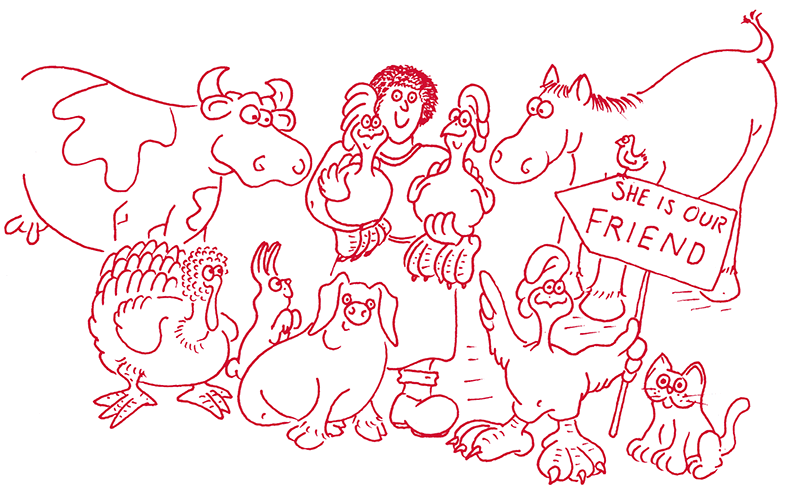Earth's Best Friend is Vegetarian

Illustration by Nigel Burroughs
In "The Oil We Eat" (Harper's Magazine, Feb. 2004), Richard Manning laments the effects of factory farming. But while noting that "Eighty percent of the grain the United States produces goes to livestock," he dismisses vegetarianism and ends his essay by shooting an elk "to save the earth," with this excuse: "I killed, but then so did you even when you bought that package of tofu burger." UPC President Karen Davis responds in the April issue of Harper's along with philosopher Michael Allen Fox, author of Deep Vegetarianism (Temple UP, 1999). Here is Karen's letter followed by an excerpt from Deep Vegetarianism.
Karen Davis, Harper's, p. 4:
According to Richard Manning, "vegetarians claim their habits are kinder to animals, though it is difficult to see how wiping out 99 percent of wildlife's habitat, as farming has done in Iowa, is a kindness."
In the mid-Atlantic region of the United States, thousands of football-field-long buildings containing thousands of chickens occupy the land where wildlife once thrived. Millions of soybean bushels are produced in this region just to feed these chickens, supplementing their dumping-ground diet of feather meal and cattle brains. Cancer rates among poultry workers are abnormally high, and chicken diseases are rampant.
Yet Manning implies that turning soybeans into tofu burgers for vegetarians is little more than a dreamer's idea of making the earth a better place compared with the "heft" of shooting an elk. This descent into personal violence weakens his otherwise credible argument.
From Deep Vegetarianism by Michael Allen Fox (Philadelphia: Temple University Press, 1999), pp. 181-183:
Richard Manning has recently argued that vegetarianism is a "city-bred" phenomenon, a "product of distance" or of lack of contact with animals and the land. He concedes that vegetarians "assert – correctly and importantly – a vital message: Eating grain and vegetables in general is simply a way of conserving existing solar energy." [In spite of this, he] goes on to propose a nostalgic alternative scenario for our time of the solitary hunter killing his or her own animals and living off grassland yields. This, he asserts, is a more energy-efficient way of life than (generally) supermarket-dependent vegetarianism.
That vegetarianism is an urban-generated movement should come as no surprise. An increasing proportion of the world's population is located in cities, and it would be natural to expect ever-greater moral direction to emerge from this context. In addition, past moral and social reform movements have sprung most often from urban settings, where improved education and greater awareness of issues are present. That city-dwellers are less in contact with animals and the land is no doubt true, for the most part, but this kind of proximity seems less important as a factor in moral progress than a desire to be well informed, an inclination to be reflective about the consequences of individual and collective human behavior, and a strong sense of responsibility. Urbanites are no less likely to be caring towards animals and ecologically sensitized than rural-dwellers are to be uncaring toward animals and alienated from nature.
Finally, ethical issues other than mere energy efficiency are involved in the assessment of hunting; nor is it at all plausible that an entire population of millions could sustain itself by returning to a lonely and outmoded hunter-gatherer form of existence. In addition, many vegetarians are now enjoying the options of shifting their business from supermarkets to farmers' markets, cooperative farms, and market gardens, or else cultivating their own small plots of land.
The vegetarian way of life actually offers many the chance to reestablish contact with the land and with nature, the loss of which Manning and many others rightly lament. We may hope that this process will continue and broaden in the future, as more and more people come to realize that vegetarianism, rather than being confining, is liberating as it frees us from the exploitation of animals, the domination of nature, and the oppression of one another, and frees us to discover ourselves in more positive, life-affirming ways. . . .
It is easy to feel that one's personal efforts are insignificant – a mere drop in the bucket – in the face of large-scale injustices or social ills that cry out for a remedy. But to begin, if any practice – such as meat-eating – is wrong, then it is right for each of us not to engage in it, even if this does not by itself change the world. We are better in ourselves for making this decision. We must also remember that every revolutionary social movement begins with a dedicated few who push it forward and act as the surrogate conscience of others, helping them gain a greater awareness and acquire the courage of new convictions.